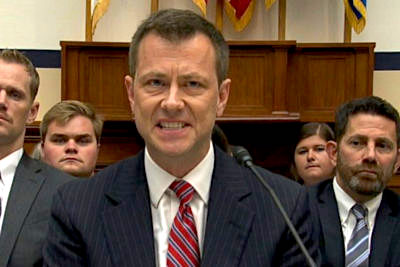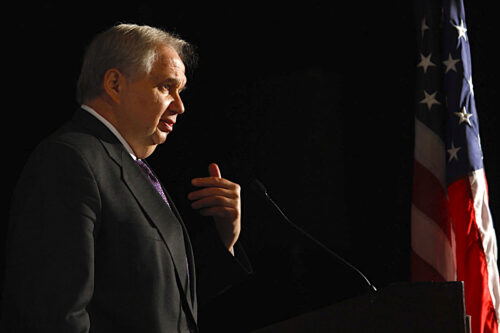Ghost of J. Edgar Haunts Flynn Investigation
by Coleen Rowley, Consortium News:

Former FBI special agent Coleen Rowley explains Bureau misdeeds in the Flynn case.
In this time of unprecedented political polarization, it’s disappointing but not surprising to see the Justice Department’s recent request to dismiss its prosecution of retired General Michael Flynn causing yet another media firestorm to swirl around Attorney General William Barr.
Obama Administration former officials, like the hyperventilating authors of this New York Times’ op-ed, “The Appalling Damage of Dropping the Michael Flynn Case,” go so far as to claim that dropping the case “embeds into official U.S. policy a shockingly extremist view of law enforcement as the enemy of the American people.”
In stark contrast, other former FBI agents, myself included, are appalled at Bureau and other “national security” officials’ numerous suspicious departures from standard FBI/Department of Justice policies that have finally been brought to light, marking this most bizarre investigation aimed at “get(ting) Flynn to lie.”
Flynn was asked to “a friendly chat” with the FBI on Jan. 24, 2017, for which he was told he would not need a lawyer present. The interview was part of the FBI’s Russiagate investigation, a purported scandal that has now all but totally collapsed.
The agents wanted to speak with him about his conversations with Sergey Kislyak, the then Russian ambassador to the U.S., while Flynn was on the Trump transition team as incoming national security advisor. Having already read the transcripts of those conversations there was nothing the agents could learn from Flynn.
According to FBI administrative notes released earlier this month, an official identified in the press as Bill Priestap, then assistant director of the FBI’s Counterintelligence Division, asked whether the only aim of the upcoming interview with Flynn was to get him to lie about his conversations with Kislyak. “Our goal is to determine if Mike Flynn is going to tell the truth about his relationship with Russians,” said Priestap in a hand-written note. But Priestap was having second thoughts.
“I agreed yesterday that we shouldn’t show Flynn [REDACTED] if he didn’t admit,” he wrote, the redaction presumably meaning the transcript of Flynn’s calls with Kislyak. “I thought about it last night, and I believe we should rethink this. What is our goal? Truth/admission or to get him to lie, so we can prosecute him or get him fired?…Protect our institution by not playing games.”
Flynn was indeed formally charged with lying to an FBI agent and on Dec. 1, 2017 pled guilty after Russiagate Special Counsel Robert Mueller reportedly threatened to prosecute his son. Flynn was then fired by Donald Trump after Flynn lied to the vice president about the conversations with Kislyak.
In those conversations, Flynn asked that the Russians not retaliate for the Obama administration sanctions on Moscow imposed for the now debunked Russiagate allegations. Russia eventually decided not to retaliate. Flynn also asked on behalf of Israel that the Russians veto a UN Security Council resolution condemning illegal Israeli West Bank settlements, which Obama was planning to abstain on. Russia refused this request.
Upon release of the FBI documents this month, Flynn sought to undo his guilty plea and last week the Justice Department dropped the case. The judge, however, has not yet agreed and has asked for expert opinion.
Law Rarely Used
Many former FBI agents will probably recall being instructed in FBI training school (as I was) that Title 18 US Code 1001 (lying to an FBI agent) is not mainly to caution a suspect not to lie, but rather to get him or her to tell the truth to further an investigation.
We were taught (and later learned by experience) that, for a lot of reasons, violation of this provision of “lying to the FBI” would almost never be prosecuted, especially if it was the sole “crime” committed. One reason for this was, at least in my law enforcement experience, that many, if not most, people who are embarrassed to be suspected of wrongdoing, do lie, or at least partially fudge the truth during initial interviews, as it’s a natural ego-defense.
Please Donate to Consortium News’ 25th
Anniversary Spring Fund Drive
So “getting” someone to lie, if that’s “the goal” (as admitted in the released FBI administrative notes on the Flynn case), is actually very easy. If the green light is now on to use T 18 USC 1001 law in this manner, the sky’s the limit. The FBI could lock up the world. In one of the released emails, FBI attorney Lisa Page shows how rare prosecution under 1001 is by writing:
“I have a question for you. Could the admonition re 1001 be given at the beginning of the interview? Or does it have to come following a statement which agents believe to be false? Does the policy speak to that? (I feel bad that I don’t know this but I don’t remember ever having to do this! Plus I’ve only charged it once in the context of lying to a probation officer.)”
Fired FBI Agent Peter Strzok, a zealous Russiagater who took part in the Flynn interview, and (his paramour) Page, appear in the Flynn case to have run roughshod over basic FBI legal policy, aptly detailed by retired supervisory agent Thomas Baker and other FBI agents.
Read More @ ConsortiumNews.com
Loading...





